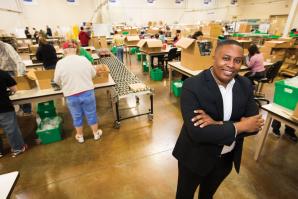Change at any level — personal, professional or civic — doesn’t come easily, and we frequently need an urgent situation to force change.
We have just such an urgent situation in our region today: an 11 percent unemployment rate, depressed real estate and construction markets and continuing budget crises at virtually all levels of government.
Our cities and counties have been through wrenching cutbacks, with more in the forecast; our public services — from mental health to libraries to parks — are barely limping along. And our schools at every level are reeling from cutbacks and inconsistent budgets.
Local pundits label our citizens “cranky,” generally discouraged by what appears to be a decline in our public institutions and prospects for the future. We no longer feel confident that hard work will lead us to the American dream of economic prosperity and social success.
Perhaps even more discouraging is our lack of vision for how to improve the future. Unless we have a vision that is clear and compelling, most of us are unwilling to put in the energy, emotion and money to work for change.
But we have an opportunity to help create just such a vision next month: The June primary elections give us a chance to focus on the future by electing people who aren’t stuck in the past and willing to settle for the status quo.
Nowhere is that truer than in Sacramento, where we have 13 candidates vying for four City Council spots. The sheer number of candidates shows a level of energy and excitement among potential leaders that we have seldom seen. It also shows a maturing of a community that in years past tended to re-elect the same familiar faces term after term.
We simply can’t settle for the same faces, the same debates. We need city leaders willing to re-imagine city governments, to make fundamental changes in what city government can and should do.
Let’s start with city revenues. Right now, most city leaders are hogtied by the small amount of revenue they actually control. Once mandated obligations are paid, most of every discretionary dollar — about 85 cents — pays for police and fire. What’s left has to cover everything else. Meanwhile, the cash-strapped state is pushing more obligations on counties and cities, often without the funds to cover costs. Sales tax has been the main way to bolster income, and meanwhile, city leaders are feeling forced to make land-use decisions based on where they can generate revenue.
If we were starting over today, is this the way we would structure our budgets? Or do we need a fundamental shift in the way cities define their mission and deliver services? Just how can our cities put economic development at the top of their agenda? How can city leaders work more proactively with partners in business, education and the nonprofit sector?
These are the kinds of questions we should be asking our potential city leaders. Each of us needs to do our homework, examine the candidates’ backgrounds, follow debates and evaluate their positions.
Then we need to assess which candidate is apt to imagine, lead and implement change — to help us develop that vision which makes change seem both necessary and desirable. We simply can’t afford more of the status quo.
Recommended For You

Rapid Success
Chris Johnson is an impatient inventor with a purpose
Chris Johnson is the inventor of Rapid Ramen Cooker, a square, microwaveable bowl that cooks ramen in four minutes. What he evidently lacks in patience, he makes up for in ingenuity.

GOP on Deck
Can the Republican contenders overcome Brown in 2014?
With just over a year until the midterm elections, California’s next gubernatorial race is starting to take shape.


